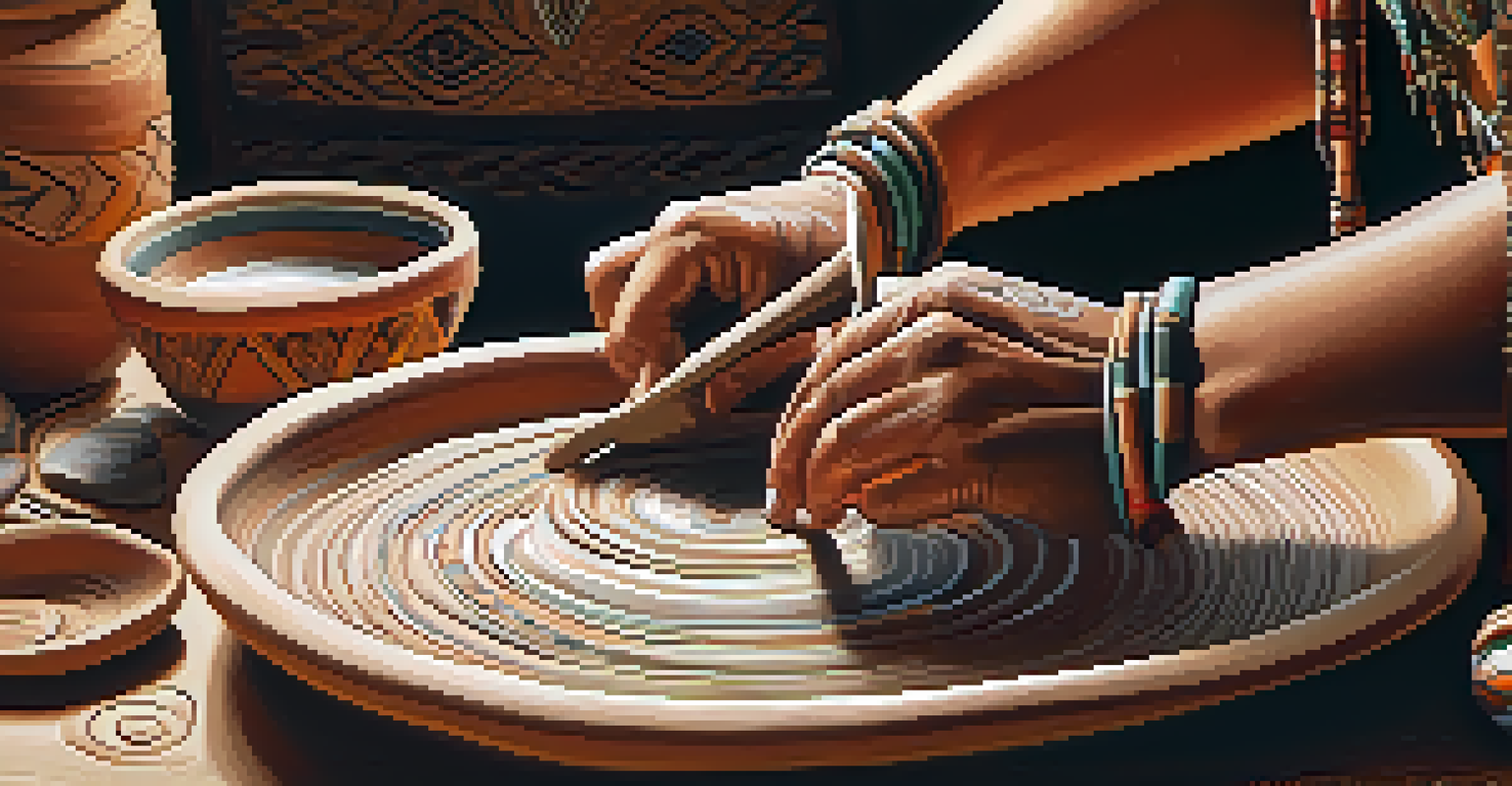The Role of Native American Women in Illinois History

Introduction to Native American Women in Illinois
Native American women in Illinois have played a crucial role throughout history, often serving as the backbone of their communities. Their contributions span various aspects of life, from agriculture to governance, and their stories are essential to understanding the broader narrative of Illinois history. The resilience and strength of these women not only shaped their tribes but also influenced the state’s cultural landscape.
Indigenous women are the backbone of their communities, preserving culture and advocating for change.
In pre-colonial times, women were key figures in agricultural practices, managing crops like corn, beans, and squash, which formed the basis of their diets. Their agricultural knowledge was passed down through generations, showcasing the importance of female leadership in sustaining their communities. This cultivation of land and resources laid the groundwork for the societal structures that would follow.
As European settlers arrived, the roles of Native American women began to evolve. They found themselves navigating complex relationships with new cultures while maintaining their traditions. This adaptability highlights their significance not only within their tribes but also in the broader context of historical interactions in Illinois.
Cultural Preservation and Storytelling
One of the most significant contributions of Native American women has been their role in cultural preservation. They were often the keepers of stories, traditions, and languages that might otherwise have been lost. Through storytelling, they passed down vital knowledge about their heritage and cultural practices to future generations.

These narratives were not merely entertainment; they served educational purposes, teaching values, history, and survival skills to younger members of their communities. The oral tradition was a vital means of preserving identity, especially during times of upheaval and change. Women’s voices were central in ensuring that their cultures endured despite external pressures.
Cultural Preservation by Women
Native American women have been vital in preserving their tribes' stories, traditions, and languages, ensuring cultural continuity for future generations.
In modern times, efforts to revive and promote Native American languages and traditions often spotlight the contributions of women. Organizations and initiatives led by Indigenous women are increasingly gaining recognition for their work in cultural revitalization, demonstrating the enduring impact of these historical traditions.
Political Activism and Leadership Roles
Native American women have long been active in political spheres, advocating for their rights and the rights of their communities. Historically, women held significant influence within tribal governance, often making critical decisions about resource management and community welfare. Their leadership roles challenge the traditional narratives that often portray Native American societies as male-dominated.
The stories of Native American women are not only crucial to understanding history but also to shaping the future.
In Illinois, women played pivotal roles during periods of conflict, such as the Black Hawk War, where they organized efforts to protect their communities. Their involvement in these political struggles showcased not just their bravery but also their strategic thinking and diplomacy. This activism laid the groundwork for future generations of Native American women to engage in political advocacy.
Today, Indigenous women continue to be at the forefront of social justice movements, advocating for environmental protection, health care, and education. Their voices are essential in conversations about policy changes that affect their communities, ensuring that their perspectives are heard and considered.
Economic Contributions and Innovations
The economic roles of Native American women in Illinois have been pivotal, particularly in relation to the fur trade and agriculture. Women were often involved in the production of goods, such as pottery and textiles, which were essential for trade. Their craftsmanship not only contributed to the economy but also reflected their cultural identity and artistry.
With the advent of European contact, Indigenous women adapted their knowledge of resources to create new products that appealed to settlers. This innovation was crucial in establishing economic relationships between Native tribes and European settlers. Their ability to navigate these changing dynamics speaks to their resourcefulness and adaptability.
Political Advocacy and Leadership
Throughout history, Native American women have actively engaged in political advocacy, challenging traditional narratives and leading efforts for community welfare.
In contemporary society, Native American women are increasingly taking on entrepreneurial roles, starting businesses that honor their heritage while also contributing to local economies. These ventures not only support their communities but also serve as platforms for cultural exchange and education.
Education and Mentorship Roles
Education has always been a priority for Native American women, who recognized the importance of knowledge transfer for both their families and communities. Traditionally, women were responsible for teaching children essential life skills, from cooking and gathering to storytelling and cultural practices. Their roles as educators were integral to the continuity of their cultures.
In more recent times, Native American women have become advocates for educational access and equity, fighting for better resources and representation in schools. They understand that education is a powerful tool for empowerment and community advancement. Many have taken on roles as teachers, mentors, and leaders within educational institutions, inspiring the next generation.
Through programs aimed at enhancing educational opportunities for Indigenous youth, women are playing a vital role in bridging gaps in knowledge and resources. Their dedication to mentorship fosters a sense of identity and pride among young Native Americans, ensuring that cultural legacies continue to thrive.
Health and Wellness Advocacy
Native American women have been at the forefront of health and wellness advocacy within their communities, addressing unique challenges faced by Indigenous populations. They have historically been caretakers and healers, utilizing traditional practices and knowledge to promote health. This role has been essential in maintaining the overall well-being of their communities.
In recent years, there has been a growing focus on addressing health disparities affecting Native American populations, and women are leading these efforts. They are involved in initiatives aimed at improving access to healthcare, mental health resources, and nutritional education. Their advocacy reflects a deep understanding of the cultural contexts that influence health outcomes.
Economic Innovation and Impact
Native American women have significantly contributed to the economy through entrepreneurship and crafting, adapting their skills to create goods for trade.
Programs developed by Native American women often emphasize holistic approaches that incorporate traditional healing methods alongside modern medical practices. This blend not only respects their heritage but also provides comprehensive solutions to health challenges faced by their communities.
Conclusion: The Legacy of Native American Women in Illinois
The legacy of Native American women in Illinois is a profound testament to their resilience and contributions throughout history. Their roles have evolved, yet their impact remains deeply ingrained in the fabric of both Indigenous and state history. From cultural preservation to political activism, their influence has been far-reaching and transformative.
As we reflect on the history of Illinois, it’s essential to recognize and honor the voices of Native American women. Their stories are not just a part of the past; they continue to shape the present and future of their communities. Acknowledging their contributions helps foster a more inclusive understanding of history.

Moving forward, it is crucial to amplify the narratives of Native American women and support their ongoing efforts in various fields. By doing so, we contribute to a more equitable society that values and embraces diverse perspectives and experiences.